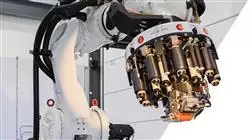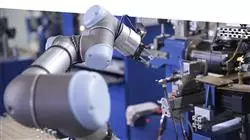University certificate
The world's largest faculty of information technology”
Introduction to the Program
A Postgraduate certificate that will lead you to Computer Vision, a field that has undergone a great revolution in recent years. Don't fall behind, enroll now"

This Postgraduate certificate, aimed at IT professionals, delves into Computer Vision in Robotics, with special emphasis on image processing and analysis. An advanced knowledge taught by an expert teaching team in Robotics, which will show students the importance of a correct work to improve the mobility and autonomy of a machine.
An online teaching that will focus on the complex world of robotic navigation. A learning where the students will be able to know perfectly the different techniques used by the scientific community in the area of Robotics to process the data that the machines collect, in order to obtain the most useful information for decision making of the robot itself. It will also delve into vision techniques based on Learning Systems, the use of Neural Networks, specifically Deep Neural Networks, which has revolutionized the way in which Computer Vision is used.
A program with a theoretical-practical approach with the most updated multimedia content for students to acquire a learning that will allow them to progress in their professional career in a field that has grown in recent years and whose future prospects are positive. It is, therefore, an excellent opportunity to acquire a quality and flexible education. Students only need an electronic device with internet connection to access the entire syllabus at any time of the day, without fixed schedules, and with the ease of distributing the teaching load according to their needs.
You have at your disposal 24 hours a day the most up-to-date multimedia content in Robotics, so you can access it whenever and wherever you want"
This Postgraduate certificate in Computer Vision Algorithms in Robotics: Image Processing and Analysis contains the most complete and up-to-date program on the market. The most important features include:
- Case studies presented by experts in robotic engineering
- The graphic, schematic, and practical contents with which they are created, provide scientific and practical information on the disciplines that are essential for professional practice
- Practical exercises where self-assessment can be used to improve learning
- Its special emphasis on innovative methodologies
- Theoretical lessons, questions to the expert, debate forums on controversial topics, and individual reflection assignments
- Content that is accessible from any fixed or portable device with an Internet connection
Acquire advanced knowledge in learning techniques for Localization and Mapping in Mobile Robotics with this Postgraduate certificate”
The program’s teaching staff includes professionals from the sector who contribute their work experience to this educational program, as well as renowned specialists from leading societies and prestigious universities.
The multimedia content, developed with the latest educational technology, will provide the professional with situated and contextual learning, i.e., a simulated environment that will provide immersive education programmed to learn in real situations.
This program is designed around Problem-Based Learning, whereby the professional must try to solve the different professional practice situations that arise during the academic year For this purpose, students will be assisted by an innovative, interactive video system created by renowned and experienced experts.
During 6 weeks you will learn the most used techniques and tools for 3D segmentation"

You will gain advanced knowledge in Deep Neural Networks and their application in Industry 4.0"
Why study at TECH?
TECH is the world’s largest online university. With an impressive catalog of more than 14,000 university programs available in 11 languages, it is positioned as a leader in employability, with a 99% job placement rate. In addition, it relies on an enormous faculty of more than 6,000 professors of the highest international renown.

Study at the world's largest online university and guarantee your professional success. The future starts at TECH”
The world’s best online university according to FORBES
The prestigious Forbes magazine, specialized in business and finance, has highlighted TECH as “the world's best online university” This is what they have recently stated in an article in their digital edition in which they echo the success story of this institution, “thanks to the academic offer it provides, the selection of its teaching staff, and an innovative learning method aimed at educating the professionals of the future”
A revolutionary study method, a cutting-edge faculty and a practical focus: the key to TECH's success.
The most complete study plans on the university scene
TECH offers the most complete study plans on the university scene, with syllabuses that cover fundamental concepts and, at the same time, the main scientific advances in their specific scientific areas. In addition, these programs are continuously being updated to guarantee students the academic vanguard and the most in-demand professional skills. In this way, the university's qualifications provide its graduates with a significant advantage to propel their careers to success.
TECH offers the most comprehensive and intensive study plans on the current university scene.
A world-class teaching staff
TECH's teaching staff is made up of more than 6,000 professors with the highest international recognition. Professors, researchers and top executives of multinational companies, including Isaiah Covington, performance coach of the Boston Celtics; Magda Romanska, principal investigator at Harvard MetaLAB; Ignacio Wistumba, chairman of the department of translational molecular pathology at MD Anderson Cancer Center; and D.W. Pine, creative director of TIME magazine, among others.
Internationally renowned experts, specialized in different branches of Health, Technology, Communication and Business, form part of the TECH faculty.
A unique learning method
TECH is the first university to use Relearning in all its programs. It is the best online learning methodology, accredited with international teaching quality certifications, provided by prestigious educational agencies. In addition, this disruptive educational model is complemented with the “Case Method”, thereby setting up a unique online teaching strategy. Innovative teaching resources are also implemented, including detailed videos, infographics and interactive summaries.
TECH combines Relearning and the Case Method in all its university programs to guarantee excellent theoretical and practical learning, studying whenever and wherever you want.
The world's largest online university
TECH is the world’s largest online university. We are the largest educational institution, with the best and widest online educational catalog, one hundred percent online and covering the vast majority of areas of knowledge. We offer a large selection of our own degrees and accredited online undergraduate and postgraduate degrees. In total, more than 14,000 university degrees, in eleven different languages, make us the largest educational largest in the world.
TECH has the world's most extensive catalog of academic and official programs, available in more than 11 languages.
Google Premier Partner
The American technology giant has awarded TECH the Google Google Premier Partner badge. This award, which is only available to 3% of the world's companies, highlights the efficient, flexible and tailored experience that this university provides to students. The recognition as a Google Premier Partner not only accredits the maximum rigor, performance and investment in TECH's digital infrastructures, but also places this university as one of the world's leading technology companies.
Google has positioned TECH in the top 3% of the world's most important technology companies by awarding it its Google Premier Partner badge.
The official online university of the NBA
TECH is the official online university of the NBA. Thanks to our agreement with the biggest league in basketball, we offer our students exclusive university programs, as well as a wide variety of educational resources focused on the business of the league and other areas of the sports industry. Each program is made up of a uniquely designed syllabus and features exceptional guest hosts: professionals with a distinguished sports background who will offer their expertise on the most relevant topics.
TECH has been selected by the NBA, the world's top basketball league, as its official online university.
The top-rated university by its students
Students have positioned TECH as the world's top-rated university on the main review websites, with a highest rating of 4.9 out of 5, obtained from more than 1,000 reviews. These results consolidate TECH as the benchmark university institution at an international level, reflecting the excellence and positive impact of its educational model.” reflecting the excellence and positive impact of its educational model.”
TECH is the world’s top-rated university by its students.
Leaders in employability
TECH has managed to become the leading university in employability. 99% of its students obtain jobs in the academic field they have studied, within one year of completing any of the university's programs. A similar number achieve immediate career enhancement. All this thanks to a study methodology that bases its effectiveness on the acquisition of practical skills, which are absolutely necessary for professional development.
99% of TECH graduates find a job within a year of completing their studies.
Postgraduate Certificate in Computer Vision Algorithms in Robotics: Image Processing and Analysis
Computer vision algorithms refer to a set of techniques and processes that are used to analyze images and extract valuable information from them. In robotics, these algorithms are applied to enable robots to ""see"" and understand their environment, and thus make decisions and perform tasks autonomously and intelligently.
Specialize in Computer Vision Image Processing and Analysis in Robotics.
In robotics, computer vision algorithms are applied in image processing and analysis for various tasks: Object localization: vision algorithms help robots detect and localize objects in their environment, enabling them to interact with them effectively. For example, robots can detect objects on a conveyor belt and autonomously remove them. Pattern recognition: algorithms are also applied to recognize specific patterns in images, such as shapes, colors or textures. This is useful in situations where a robot needs to identify certain objects or features in its environment to perform its task. Tracking moving objects: vision algorithms also allow robots to track moving objects. This is especially useful in applications such as part inspection on an assembly line, where robots need to follow moving parts to detect any defects. Image analysis: Vision algorithms are used to analyze images and extract specific information. For example, robots can analyze X-ray images to detect damage or defects in a part or product.
At TECH Global University we have this university program designed to provide specialized knowledge in the study of algorithms and image processing and analysis techniques in robotics, with the objective of developing autonomous systems that can perceive, interpret and act in the real world. It is an excellent choice for those who wish to acquire specialized skills and develop a successful career in this field.







